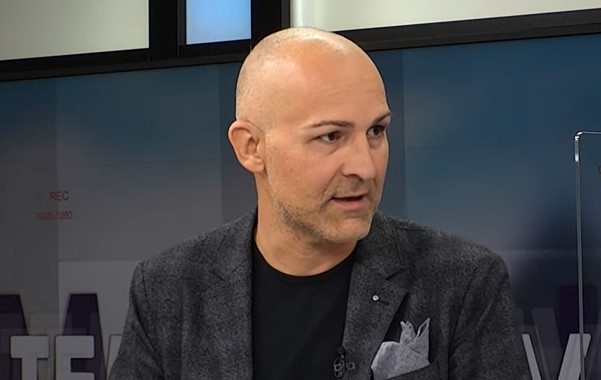“RTV may become insolvent within a year if we do not make the right moves. From the point of view of business, it is crucial, and from the point of view of the legality of the operation of the national radio and television it is important to regulate mutual relationships in the new composition and begin to properly monitor this operation,” said Borut Rončević, the new chairman of the Supervisory Board of the national media outlet, Radio and Television of Slovenia, when he was a guest on the show Tema dneva (Topic of the Day) on our television station. He was elected by the members of the board, as he had been leading the Supervisory Board for a while now, after the departure of former chairman Andrej Grah Whatmough, who became the Director-General of RTVS.
At Friday’s session, a new Supervisory Board of the Radio Television of Slovenia (RTVS) was constituted for the 2022-2026 term of office. The Supervisory Board is in charge of supervising the operations of the public media service. It consists of eleven members, with five members appointed by the National Assembly, four by the government, and two members elected by the employees of RTV. Representatives of the government are Borut Rončević, Aleksander Kotnik, Anton Tomažič and Milenko Ziherl. The National Assembly appointed Romana Fišer, who was nominated by the DeSUS parliamentary group, Tamara Besednjak Valič (SDS), Janez Čadež (NSi), Metka Čobec (Konkretno) and Alenka Vodončnik (SNS). Employee representatives have not yet been appointed, as the electoral commission at RTVS found that the elections of workers’ representatives to the programme and supervisory boards, as well as to the programme committees of the national minorities and the workers’ council, were partially invalid, because all eligible voters were not able to vote on the 11th of January. An additional election day was called for Thursday.
It is crucial to regulate the interpersonal relationships
Dr Borut Rončević, the new chairman of the RTVS Supervisory Board, was given new duties with his new role, which he also spoke about in the introduction. As the most urgent matter, Rončević pointed out that the public television, with a budget of 120 million euros a year, was without legal supervision due to illegal convening of meetings of the Supervisory Board by a person who should not have been convening them, for half a year. “From the point of view of business, it is crucial, and from the point of view of the legality of the operation of the national radio and television, it is important to regulate mutual relationships in the new composition and begin to properly monitor this operation.”
Operations of top management that are financially inadequate is one of the problems of RTVS
Regarding the concerns about the appointment of both the supervisory and programme councils or the hinting that the appointment of councillors is an attempt to influence the content and journalistic work, Rončević pointed out two problematic points of RTVS, namely: “The first is the imbalance and bias of a certain part of the programmes, especially within the news programmes, which we measured and effectively demonstrated in one of our studies,” and the second serious problem he brought up is the actual unsustainable business operations, which he explains as financially inadequate operations of the top management, which has now lasted for a decade and a half, and tells us that this is actually something that they can influence due to their jurisdiction – “in about a year and a half, which is the time I have spent as a member of the Supervisory Board of RTVS, we have not once talked about anything that would not fall under our jurisdiction.”
RTVS needs a thorough overhaul
Under the jurisdiction of Valentin Areh, the deputy director of RTVS, they had to cut into the software due to the financial crisis, which was not well received by the employees. Rončević remains reticent when asked about his support for Valentin Areh and his work, as he believes that he can only support the content of the public media service as a consumer of media content, “with the desire for the national television to become neither left nor right, but neutral, and that it is interesting for all the people of Slovenia. But as far as the financial side is concerned, it is precisely because of this inoperability of the council and the illegal actions of former members that we have not been able to adopt a financial plan yet; however, we will probably do so at the February session.” The reason for this being the key move that needs to be made as soon as possible is that RTVS is in a very poor financial state, and Rončević explained that it might even become insolvent within a year if the right moves are not made.
Despite the current shortage of two members, the Supervisory Board has full powers
Representatives from the ranks of the employees have not yet been appointed, as the electoral commission at RTVS found that the elections of workers’ representatives to the programme and supervisory boards, as well as to the programme committees of the national minorities and the workers’ council were partially invalid, because all eligible voters were not able to vote on the 11th of January. An additional election day was called for Thursday. Rončević said that he has no more information about this than the general public, but “as a member of the Supervisory Board, I want the workers to elect their representatives as soon as possible, in order to relive the Supervisory Board,” he said, and added that despite the board being incomplete, it can still function smoothly and with all competencies with only nine members.
Tanja Brkić


